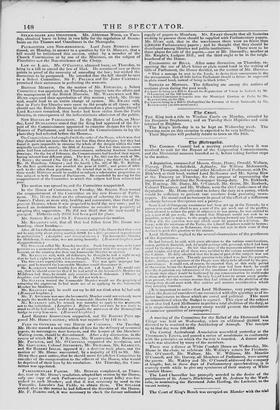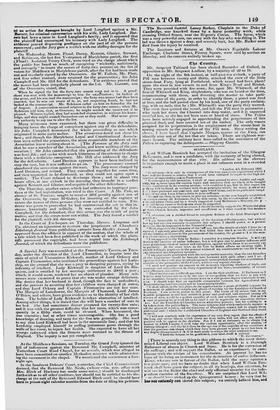The Court of King's Bench was occupied on Monday with
the trial of as action for damages brought by Lord laingford against as Mr. Barrett, for criminal conversation with his wife, Lady Langford. Bar. rate had been a tutor in Lord Langford's family ; and it appeared that the plaintiff bad encouraged his intimacy with Lady Langford. The evidence proved disgusting profligacy on the part of all the persons concerned ; and the Jury gave a verdict with one shilling damages for the
On Wednesday, Messrs. Flood, Davey, Kensett, Glazier, Stewart, and Robinson, the last five Vestrymen of Marylebone parish, the first (Flood) Assistant Vestry Clerk, were tried on the charge about which the public has heard so much, of conspiring " wickedly, maliciously, and corruptly" to insert the names of forty-two persons on the list of voters for Middlesex in Marylebone parish, after the list had been made out and reeularly signed by the Overseers. Sir W. Follett, Mr. Platt, and four other counsel, were retained for the prosecution ; Sir John Campbell and Mr. Hill for the defendants. The evidence proved that the mimes had been irregularly placed on the Ist. Mr. Garnett, one of the Overseers, stated, that When he signed the list the forty-two names were not in it. A proof-
• sheet was gent with the manuscript to him for exanTination ; he looked at 'the print, and his son read the manuscript ; the forty-two names had then been inserted, but he was not aware of it, as, not suspecting fraud, he had not looked at the manuscript. Mr. Robinson called on him on Saturday the 1st of August. A conversation ensued relative to the forty-two names; when Mr. Robinson told him, that, as Overseer, he might scratch the names out it he pleased. Witness replied, they had scratched themselves in without his know- ledge, and they might scratch themselves out as they could. Had never given any authority to any one to alter the list.
Many witnesses were examined, but there was great difficulty in bringing home the charge of conspiracy against any of the defendants. Sir John Campbell denounced the whole proceeding us one which originated in mere party malice. The prosecutor dared not show his face ; and though the Marylebone Loyal and Constitutional Associa- tion were called the prosecutors, the more respectable members of the Association knew nothing about it. [The Foreman of the Jury said that he was a member of the Association, and knew nothing of the pro- secution.] Sir John contended that the proceeding of the defendants was bonii fide ; and spoke with much bitterness of the attempt to charge them with a malicious conspiracy. Mr. Hill also addressed the Jury for the defendants. Lord Denman appears to have been inclined to stop the case, but it was suffered to go on. The prosecutors' counsel abandoned the accusition against Stewart. The Jury were charged by Lord Denman, and retired. They consulted together for some time, and then requested to be dismissed, as they could not agree upon a verdict. The Court refused to discharge them ; and in about two hours after, at one o'clock in the morning, they brought in a verdict -against Kensett and Glazier, and acquitted the other defendants.
On Thursday, another cause, which had reference to improper prac- tices at the List registration, was tried in this Court. A Mr. Farr, an elector of St. Pancras, sought to recover 5001. penalty against one of the Overseers; by came M'Gahey, for inserting on the register of voters the names of three persons who were not entitled to vote. Evi- dence was given to prove.thet he had contravened the net in this in. stance, knowingly and wilfully. It was contended by Sir John Campbell, for the defendant, that this action was the result of parry malice, and that the errors were not wilful. The Jury found a verdict for the plaintiff, with .501. damages.
In the Court of Exchequer, on Thursday, Messrs. Longman and Co. obtained an injunction to restrain the proprietors of Chambers's Edinburgh Journal from publishing extracts from Heath's Annual. It appeared from the affidavit in support of the motion, that the whole of a tale which lied bees first published in the work of which the plain- tiffs possessed the copyright, had been copied into the Edinburgh .Journal, of which the defendants were the publishers.



























 Previous page
Previous page